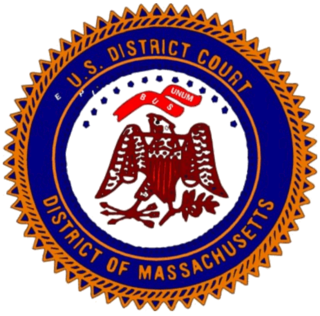United States v. Jones may refer to several Supreme Court cases:
Charles, Charlie, Charley or Chuck Jones may refer to:
William, Willie, Will, Bill, or Billy Smith may refer to:
William Allen may refer to:
John Davis may refer to:

The United States District Court for the District of Massachusetts is the federal district court whose territorial jurisdiction is the Commonwealth of Massachusetts, United States. The first court session was held in Boston in 1789. The second term was held in Salem in 1790 and court session locations alternated between the two cities until 1813. That year, Boston became the court's permanent home. A western division was opened in Springfield in 1979 and a central division was opened in Worcester in 1987. The court's main building is the John Joseph Moakley Federal Courthouse on Fan Pier in South Boston.
This is a timeline of the history of organized crime.
AFI's 100 Years...100 Stars is the American Film Institute's list ranking the top 25 female and 25 male greatest screen legends of American film history and is the second list of the AFI 100 Years... series.
Comet Brooks may refer to any one of 17 comets:
Frank Murphy (1890–1949) was a governor of Michigan and later justice of the United States Supreme Court.
Dodge is a surname.

Rufus Adolphus Ayers was a Virginia lawyer, businessman, and politician, who served as Attorney General of Virginia.
Jones v. United States may refer to:
United States v. Jones, 565 U.S. 400 (2012), was a landmark United States Supreme Court case in which the court held that installing a Global Positioning System (GPS) tracking device on a vehicle and using the device to monitor the vehicle's movements constitutes a search under the Fourth Amendment.